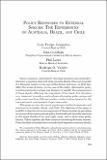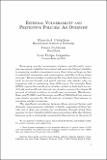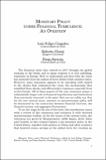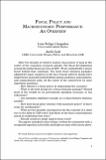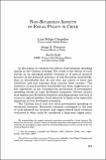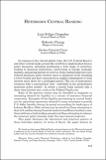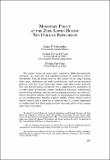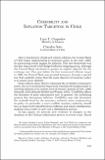Buscar
Mostrando ítems 1-8 de 8
Policy responses to external shocks: the experiences of Australia, Brazil, and Chile
Open economies, particularly emerging markets and commodityintensive economies, deal with large external shocks. These are typically of a financial nature in the case of the former and real—in that they affect the terms of trade—in the case of the latter. Alternative policy reactions and policy setups ...
External vulnerability and preventive policies: an overview
Emerging market economies endure significantly more macroeconomic volatility than industrial countries. Output volatility in emerging market economies is more than twice as large as that in industrial economies, and consumption volatility is three times as large. Recent studies corroborate the view ...
Monetary policy under financial turbulence: an overview
The financial crisis that started in 2007 brought the global economy to the brink and in many respects it is still unfolding especially in Europe. How to understand and deal with the crisis has naturally been the subject of fierce debates that continue today. However some consensus appears to be ...
Fiscal policy and macroeconomic performance: an overview
After two decades of relative neglect fiscal policy is back at the center of the economics research agenda. The fiscal developments around the global financial crisis of 2007–09 are undoubtedly a major factor behind that comeback. The large fiscal stimulus packages adopted by many countries in the ...
Non-ricardian aspects of fiscal policy in Chile
In this paper we examine the effects of government spending shocks in the Chilean economy. The study of the effects of such shocks in an emerging market economy is of special interest because of the potential presence of non-Ricardian households that is households that do not own any assets or have ...
Heterodox central banking
In response to the current global crisis the U.S. Federal Reserve and other central banks around the world have implemented diverse policy measures including purchasing a wide range of securities lending to financial institutions intervening in foreign exchange markets and paying interest on reserves. ...
Monetary policy at the zero lower bound: the Chilean experience
The global financial crisis that started in 2008 dramatically changed the analysis and implementation of monetary policy worldwide. Central banks were at the center of the stage during that time implementing both conventional and unconventional policies. Not only were monetary policy rates drastically ...
Credibility and inflation targeting in Chile
After a long history of high and volatile inflation, the Central Bank of Chile began implementing its monetary policy in the early 1990s by announcing yearly targets for inflation. This new framework was the first step toward a full-fledged inflation-targeting setup, although the Central Bank continued ...

